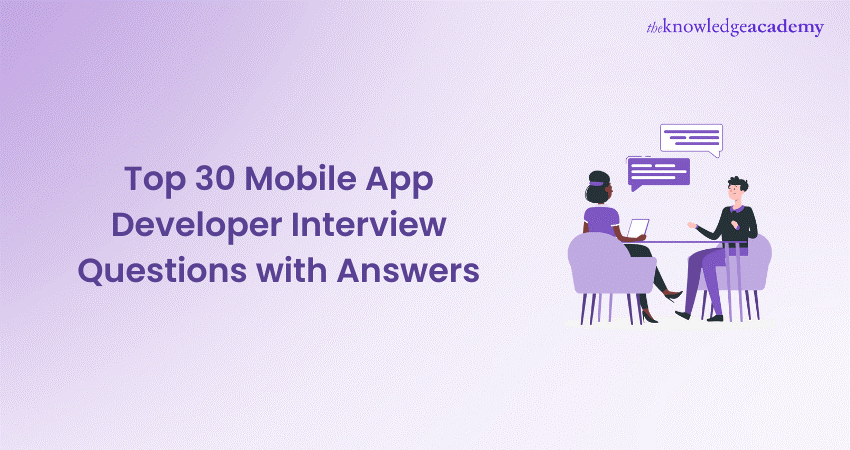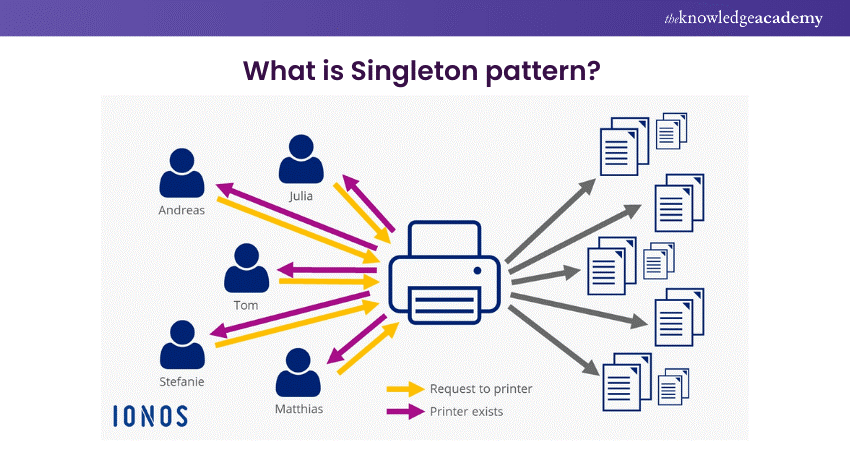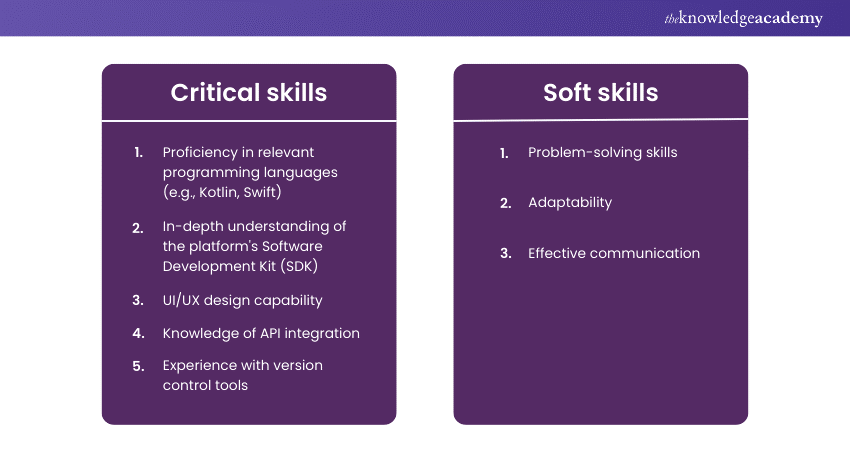We may not have the course you’re looking for. If you enquire or give us a call on +420 210012971 and speak to our training experts, we may still be able to help with your training requirements.
Training Outcomes Within Your Budget!
We ensure quality, budget-alignment, and timely delivery by our expert instructors.

Whether it is a startup on the verge of a breakthrough or an established company looking to expand its digital footprint, an interview process is crucial. It ensures that it has the right team in place. The curated list of Top 30 Mobile App Developer Interview Questions with Answers will arm you accordingly.
As mobile apps have become central to both personal and professional lives, this career option is also blooming. Below, we delve into the Top 30 Mobile App Developer Interview Questions with Answers. Read on to learn more!
Table of Contents
1) 30 Mobile App Developer Interview Questions
a) How many mobile apps have you developed?
b) Based on our project requirements, which development program would you recommend?
c) What methods do you use to stay current in the field?
d) Do you work on projects outside of your work? What projects interest you the most?
e) List some benefits of using React Native for building mobile apps.
f) Mention some advantages of hybrid apps over native apps?
g) What is Ionic Framework?
h) What is Xamarin?
i) What is Singleton pattern?
j) Explain the build process in Android.
2) Conclusion
30 Mobile App Developer Interview Questions
Keeping all factors in mind, the following list is tailored to answer Top 30 Mobile App Developer Interview Questions. So, let's have a look at them:
1) How many mobile apps have you developed?
Answer: You can answer this question by stating the number of apps you have developed previously. Your answer can also consist of the utility of the apps that you developed. For example, "I have developed X number of mobile apps. The utility of these applications ranged from interactive games to e-commerce platforms. My portfolio traverses across various industries. The range can showcase my versatility and adaptability in Mobile App Development."
2) Based on our project requirements, which development program would you recommend?
Answer: The right way to answer this question is to have a thorough understanding of the ongoing projects of the company. When you know the methods they follow and the tools they use, you can answer accordingly. The answer can sound something like - "Considering your project requirements, I recommend using [specific development program/framework], as it offers scalability, performance, and compatibility with various devices. It aligns perfectly with the goals of your project."
3) What methods do you use to stay current in the field?
Answer: Showcase your ability to be updated all the time. Let your interviewer know that you know about the current trends, tools and technologies. Regularly attending webinars, participating in developer forums, and taking online courses to stay updated are a few proofs you can provide while answering. You can score additional points if you mention about networking with other professionals, as it includes providing valuable insights.
4) Do you work on projects outside of your work? What projects interest you the most?
Answer: Answer this tactfully and help them see your passion for creating. Enjoying to work on personal projects that allow you to explore new technologies and challenge your problem-solving skills can be a boon. Your passion for developing apps projects you to be suitable and lucrative for the business.
5) List some benefits of using React Native for building mobile apps.
Answer: React Native offers several benefits. It includes code reusability for iOS and Android, a large supporting community, faster development times, and live reloading features. These benefits make it an efficient and cost-effective solution for building high-quality Mobile Apps.
6) Mention some advantages of hybrid apps over native apps?
Answer: Hybrid apps offer cross-platform compatibility, faster development cycles, cost efficiency, and easier maintenance. They are ideal for projects with limited budgets and timelines. They do not compromise on the user experience.
7) What is Ionic Framework?
Answer: Ionic Framework is an open-source UI toolkit. It is used to build high-quality mobile and desktop apps. It uses web technologies like HTML, CSS, and JavaScript, with integrations for popular frameworks like Angular and React.
Gain skills in web development by learning HTML with our HTML Course – join today!
8) What is Xamarin?
Answer: Xamarin is a Microsoft-owned framework. It lets developers to build cross-platform mobile apps using C# and .NET. It offers native performance, user experiences, and access to device-specific functionalities.
9) What is Singleton pattern?
Answer: The Singleton pattern ensures that a class has only one single instance and provides a global point of access to it. It's commonly used in scenarios where a single object is needed to coordinate actions across a system.

10) Explain the build process in Android.
Answer: The build process in Android involves several steps: compiling the app code into DEX files, packaging the DEX files and resources into an APK, signing the APK, and optimising it with the zipalign tool, making it ready for deployment.
11) How to persist data in an Android app?
Answer: Data can be persisted in an Android app using SharedPreferences, SQLite databases, or file storage (internal or external). It depends on the complexity and requirements of the data that is being stored.
12) What are the advantages of native apps over hybrid apps?
Answer: Native apps offer superior performance, better user experience with smooth animations and gestures, full access to device features, and generally more robust security measures compared to hybrid apps.
13) What is Builder pattern?
Answer: The Builder pattern is a design pattern that provides a flexible solution to construct complex objects by separating the construction process from its representation. It allows the same construction process to create different representations.
14) What is an Intent in Android?
Answer: An Intent in Android is a messaging object used to request an action from another app component. It can be used to start activities, services, and broadcast receivers, and to communicate data between them.
15) What is Hybrid App Development?
Answer: Hybrid App Development can be defined as creating apps that run on multiple platforms. It uses a single codebase, typically utilising web technologies like HTML, CSS, and JavaScript. It is enveloped in a native container to access device features.
16) What is your personal approach of balancing application development and the client's specific necessities?
Answer: Your answer should highlight a blend of technical expertise and management skills. The approach should involve maintaining an open and continuous communication with the client, setting clear expectations. Along with that adopting agile development practices to accommodate changes is very crucial. It ensures the final product aligns with the client’s requirements.
17) Are you able to develop the specific features we need?
Answer: Before answering this question, get a thorough idea about the company's requirements. Once you know about their needs, and if they are in alignment with your expertise, you can agree to the question.
18) Tell us about a recent mobile application project you have worked on. What was your process for developing the application?
Answer: Your answer should include information about all the factors- the ideation, creative process and your time management skills. The development process should begin with gathering and analysing user requirements. Followed by wireframing and designing the UI/UX. After selecting React Native for cross-platform compatibility, the process should move on to coding and integrating. The entire process should also include conducting testing phases for usability, performance, and security. The post-launch process should monitor user feedback for further improvements.
Want to know more about UI/UX tools and software? Our UI UX Design Course can help you with that – register now!
19) What skills are most important for successful application development?
Answer: Critical skills include:
1) Proficiency in relevant programming languages (e.g., Kotlin, Swift)
2) In-depth understanding of the platform's Software Development Kit (SDK)
3) UI/UX design capability
4) Knowledge of API integration
5) Experience with version control tools
Soft skills should include:
1) Problem-solving skills
2) Adaptability
3) Effective communication

20) How do you move an application across Operating Systems?
Answer: Migrating an application across Operating Systems involves identifying the core functionalities to be preserved. Adapting the codebase to the target OS's requirements and redesigning the UI/UX according to platform guidelines is equally important. Along with these, testing the new platform for compatibility and performance issues is also necessary.
21) Are there any particular frameworks or libraries that you like to use for Mobile App Development?
Answer: I frequently use React Native for its cross-platform capabilities, Flutter for its high performance and expressive UIs, and Xamarin for its ability to leverage C# across platforms. For backend integration, I prefer using Firebase for its real-time database and analytics solutions.
22) Would you recommend cross-platform development? Why or why not?
Answer: You can answer by saying about your personal ideas. The answer can be something like – “I would recommend cross-platform development for projects aiming for a faster launch and cost efficiency. It will help, specially, when the app would not require complex device-specific functionalities. However, for apps that demand high performance and deep integration with device hardware, native development might be more suitable”.
23) How would you describe complex issues to stakeholders who are not aware of technical language during application development?
Answer: I use analogies and simple terms to break down complex issues, focusing on the impact rather than the technical details. Visual aids and step-by-step explanations help stakeholders understand the problem, the proposed solutions, and how it affects the project's outcome.
24) What actions do you implement to help prevent a crash?
Answer: To prevent crashes, I prioritise robust error handling, conduct thorough testing across different devices and OS versions, implement crash analytics tools to quickly identify and fix issues, and maintain a regular update schedule to address any potential vulnerabilities.
25) What security measures do you implement during the development process?
Answer: Security measures include implementing secure communication protocols (HTTPS, SSL/TLS), data encryption at rest and in transit, using OAuth for authentication, conducting regular code reviews for security vulnerabilities, and adhering to best practices for secure storage of sensitive information.
26) Could you explain the application project in colloquel terms?
Answer: Imagine our application as a digital butler for your shopping needs. Just like a butler knows your preferences, the app understands your shopping habits and recommends products you'll love. It's your go-to destination for browsing, comparing, and purchasing products, all from the comfort of your home.
27) What is your process for load testing?
Answer: My process for load testing involves simulating high numbers of users interacting with the app simultaneously to measure response times, throughput rates, and the app's overall stability under stress. Tools like JMeter and LoadRunner are often used to identify any bottlenecks or performance issues.
28) Do you prefer to work alone or with a team when creating an app?
Answer: This question mostly judges whether you are a team player or not. You can answer tactfully: "While I enjoy the independence of working alone on certain aspects, collaborating with a team brings diverse perspectives and expertise on a single plate. It can greatly improve the development process and end product". A balanced environment, using both individual strengths and team collaboration, often yields the best results.
29) Describe your experience with deploying and managing mobile applications in the cloud.
Answer: Here, present your observations that will show your observational skills and technical knowledge. The experience should include deploying apps to cloud platforms such as AWS and Google Cloud, leveraging scalability and dependability. You can answer this way: "I manage app performance, monitor usage analytics, execute Continuous Integration/Continuous Deployment (CI/CD) pipelines, and ensure security observation".
30) What do you think makes a successful mobile application?
Answer: A successful mobile application smoothly combines intuitive UI/UX design with potent functionality. It addresses genuine needs or solves problems for its users. Its success is measured by user engagement, positive reviews, and the ability to adapt to user feedback and evolving technology trends.
Conclusion
In conclusion, the Top 30 Mobile App Developer Interview Questions with Answers list should provide a framework. These will help evaluate where you, as candidates are standing, and what you need to prepare for. It will help in gaining insights about the necessary technical proficiency and ability to innovate and adapt.
Gain skills to be creative and build applications with our Mobile App Development Course - register now!
Frequently Asked Questions
Upcoming Programming & DevOps Resources Batches & Dates
Date
 Mobile App Development Course
Mobile App Development Course
Fri 26th Jul 2024
Fri 25th Oct 2024









 Top Rated Course
Top Rated Course



 If you wish to make any changes to your course, please
If you wish to make any changes to your course, please


